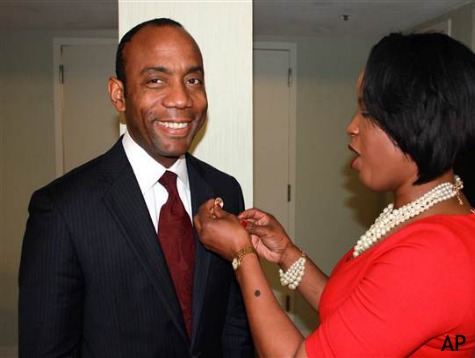Saturday, the NAACP announced that activist and lawyer Cornell William Brooks would take over as its new president and CEO. Brooks will become the 18th national president, succeeding the temporary leader, Lorraine Miller. Brooks has served as a lawyer for the Federal Communication Commission and the Justice Department. A graduate of Yale Law School, Brooks ran an unsuccessful campaign for Congress as a Democrat in Virginia in 1998.
Brooks currently serves as the president and CEO of the New Jersey Institute for Social Justice. In his time as president, he has “directed the efforts for the passing of three major reentry bills in 2010.” One of these bills is the infamous New Jersey Opportunity to Compete Act, or Ban the Box.
According to the NJISJ website, Ban the Box is an international social movement dedicated to “improving employment opportunities for individuals with criminal records.” The box refers to a question found on many job applications asking whether the applicant has a criminal background.
In a TED talk-style speech, Brooks voiced his support for the legislation, saying, “We stand for this legislation because it stands on the simple moral proposition that if a man has paid his debt to society, with the hard (inaudible) of responsibility, he deserves a second chance, particularly if he never had much of a first chance.”
The NJISJ website adds that Ban the Box legislation will not only “increase public safety by giving people with criminal records the opportunity to compete for jobs that will keep them productive, self-sufficient, and out of trouble,” but that it also will “help employers find the best person for the job by removing the distraction of criminal records that are not relevant to the job in question.”
This legislation has come under heavy criticism from both business owners, and researchers alike. “We have a responsibility to protect our customers, protect other employees, and then the company itself from potential crime” said Kelly Knot, senior director for government relations of the National Retail Federation and industry group, to the Wall Street Journal.
The New Jersey Chamber of Commerce has also voiced its opposition, which argues that “it could open employers to lawsuits from disgruntled applicants.”
Whereas in states like California, that make employers determine whether an employee is qualified or not before asking about criminal background, and leaves exceptions for certain jobs such as teachers and law enforcement, the proposed New Jersey legislation would prohibit, “all employers, not just government, from asking the question on job applications.”
The New Jersey Opportunity to Compete Act was “introduced to a statewide Fair Hiring bill also written by NJISJ.” While the legislation was not voted on before the end of the legislative session in January 2014, the bill has been reintroduced in both houses.
Follow Patrick Kane on Twitter @PatVKane.

COMMENTS
Please let us know if you're having issues with commenting.